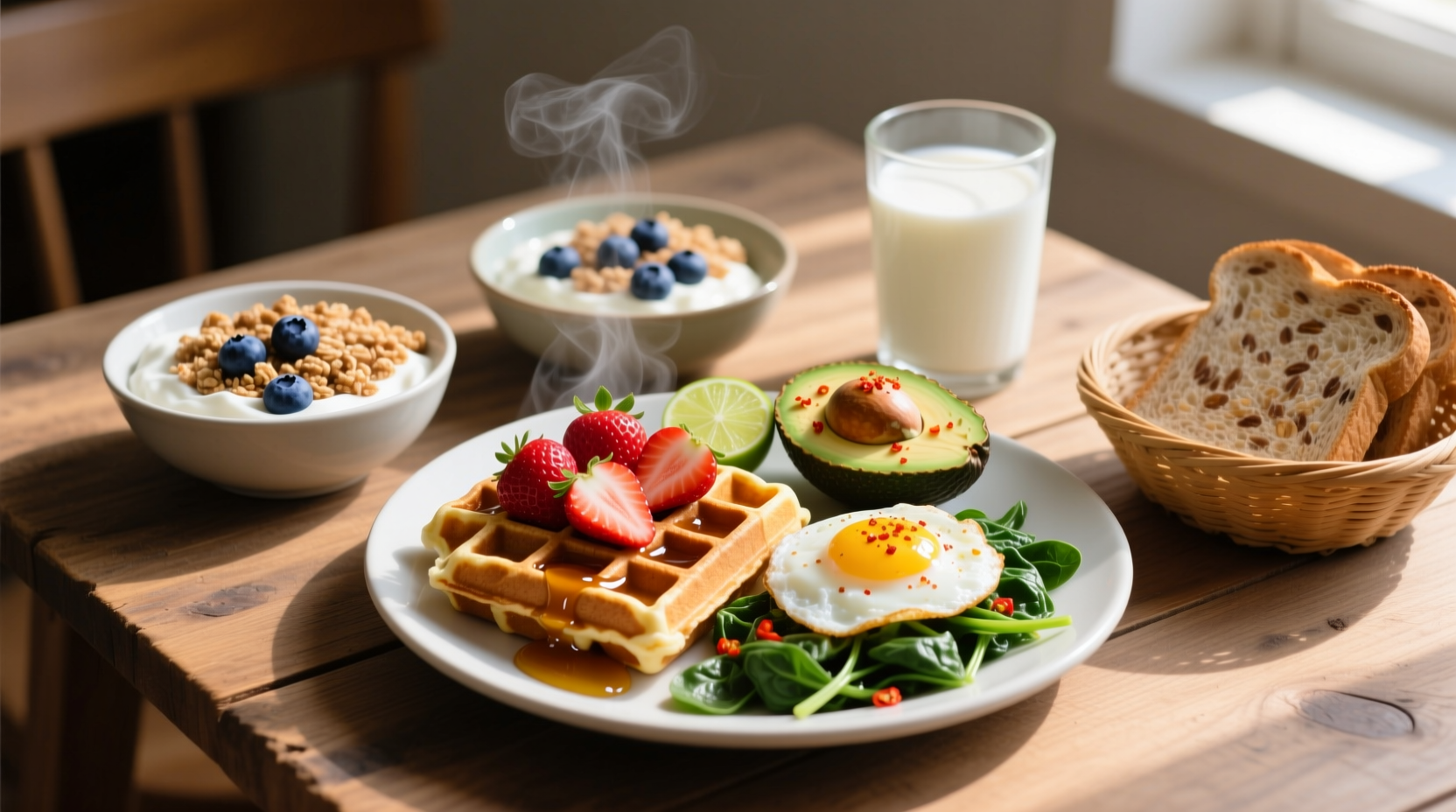The best breakfast foods combine protein, fiber, and healthy fats to sustain energy and focus. Top science-backed options include Greek yogurt with berries, eggs with vegetables, oatmeal with nuts, avocado toast on whole grain bread, and chia seed pudding. These choices provide balanced nutrition that supports metabolic health, cognitive function, and satiety throughout your morning.
Why Your Breakfast Choices Matter More Than You Think
Starting your day with the right foods isn't just about avoiding morning hunger—it's about setting your metabolic rhythm for optimal performance. Research from the Harvard T.H. Chan School of Public Health shows that breakfast patterns significantly impact energy levels, cognitive function, and long-term metabolic health. But not all breakfasts deliver equal benefits.
"The quality of your first meal shapes your body's insulin response for the entire day," explains Dr. Frank Hu, Professor of Nutrition and Epidemiology at Harvard. "A breakfast high in refined carbs creates blood sugar spikes followed by crashes, while balanced options maintain steady energy."

Breakfast Evolution: How Science Changed Our Morning Meals
Breakfast recommendations have evolved dramatically as nutritional science advanced. Understanding this timeline helps separate evidence-based choices from outdated myths:
| Era | Common Recommendations | Current Scientific Understanding |
|---|---|---|
| 1950s-1980s | Cereal with skim milk, orange juice, toast | High sugar content causes blood sugar spikes; lack of protein/fat leads to mid-morning crashes |
| 1990s-2000s | Low-fat everything, egg-white omelets | Natural fats essential for nutrient absorption; whole eggs provide complete protein and choline |
| 2010s | Protein-focused breakfasts | Protein important but must be balanced with fiber and healthy fats for sustained energy |
| 2020s | Mindful combinations of protein, fiber, healthy fats | Optimal breakfasts combine 15-25g protein, 5-10g fiber, and quality fats for metabolic health |
Top 7 Breakfast Foods Backed by Nutrition Science
1. Greek Yogurt with Berries and Nuts
Plain Greek yogurt delivers 17-20g of complete protein per serving—nearly double regular yogurt. When paired with mixed berries (rich in antioxidants) and a sprinkle of walnuts (omega-3 fatty acids), this combination provides sustained energy without blood sugar spikes. According to USDA FoodData Central, this combination delivers balanced macronutrients that support cognitive function better than sugary alternatives.
2. Eggs with Sautéed Vegetables
One large egg contains 6g high-quality protein and essential nutrients like choline (critical for brain health). The American Journal of Clinical Nutrition reports that egg-based breakfasts increase satiety and reduce calorie intake at subsequent meals compared to carbohydrate-heavy options. Add spinach, tomatoes, or peppers for fiber and additional micronutrients.
3. Steel-Cut Oats with Seeds
Unlike instant oats, steel-cut varieties have a lower glycemic index (42 vs 83 for instant) according to the University of Sydney's Glycemic Index Database. Top with chia seeds (5g fiber per tablespoon) and pumpkin seeds for magnesium and zinc. This combination provides steady glucose release while supporting gut health through diverse fiber sources.
4. Avocado on Whole Grain Toast
The monounsaturated fats in avocado (nearly 20g per fruit) help stabilize blood sugar when paired with complex carbohydrates. Research published in Journal of the American Heart Association shows that replacing refined carbs with healthy fats improves cardiovascular markers. Choose sprouted grain bread for higher fiber content and better nutrient absorption.
5. Chia Seed Pudding
Chia seeds absorb 10-12 times their weight in water, creating a gel that slows digestion and provides sustained energy. A National Institutes of Health study found chia consumption improved blood sugar control in type 2 diabetes patients. Prepare overnight with unsweetened almond milk and top with cinnamon for additional metabolic benefits.
Practical Breakfast Solutions for Different Morning Routines
For the 5-Minute Morning
Keep hard-boiled eggs ready in the fridge, pair with pre-sliced avocado and whole grain crackers. Alternatively, mix pre-portioned chia seeds with almond milk the night before for instant pudding.
For Meal Preppers
Batch-cook vegetable and egg muffins (with spinach, mushrooms, and bell peppers) for the week. Freeze individual portions and reheat in minutes. Steel-cut oats can be cooked in bulk and reheated with different toppings each day.
Context Matters: When Standard Advice Doesn't Apply
While these recommendations work for most people, certain contexts require adjustments:
- For athletes: Increase protein to 25-30g and add complex carbs like sweet potato
- For diabetes management: Focus on higher fat (avocado, nuts) with moderate protein and very low glycemic index carbs
- For digestive issues: Choose cooked vegetables over raw, fermented dairy if tolerated
Breakfast Foods to Approach With Caution
Many popular breakfast options create energy crashes despite their marketing claims:
- Flavored yogurts: Often contain as much sugar as dessert (15-25g per serving)
- Commercial granola: Typically high in added sugars and unhealthy fats
- Toast with jam: Creates rapid blood sugar spikes followed by crashes
- Breakfast bars: Many contain processed ingredients with minimal nutritional value
The Mayo Clinic advises choosing whole food options over processed alternatives whenever possible for better metabolic outcomes.
Creating Your Perfect Breakfast Combination
The ideal breakfast includes three key components in these proportions:
- Protein (30-40%): 15-25g from eggs, Greek yogurt, or plant-based alternatives
- Fiber (30-40%): 5-10g from vegetables, berries, or whole grains
- Healthy Fats (20-30%): From avocado, nuts, seeds, or olive oil
Sample combinations:
- Energy Focus: 2 eggs + 1/2 avocado + sautéed spinach
- Weight Management: Greek yogurt + mixed berries + 1 tbsp chia seeds
- Gut Health: Steel-cut oats + flaxseed + sauerkraut (yes, really!)











 浙公网安备
33010002000092号
浙公网安备
33010002000092号 浙B2-20120091-4
浙B2-20120091-4